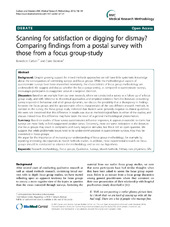| dc.description.abstract | Background: Despite growing support for mixed methods approaches we still have little systematic knowledge about the consequences of combining surveys and focus groups. While the methodological aspects of questionnaire surveys have been researched extensively, the characteristics of focus group methodology are understudied. We suggest and discuss whether the focus group setting, as compared to questionnaire surveys, encourages participants to exaggerate views in a negative direction. Discussion: Based on an example from our own research, where we conducted a survey as a follow up of a focus group study, and with reference to theoretical approaches and empirical evidence from the literature concerning survey respondent behaviour and small group dynamics, we discuss the possibility that a discrepancy in findings between the focus groups and the questionnaire reflects characteristics of the two different research methods. In contrast to the survey, the focus group study indicated that doctors were generally negative to clinical guidelines. We were not convinced that this difference in results was due to methodological flaws in either of the studies, and discuss instead how this difference may have been the result of a general methodological phenomenon. Summary: Based on studies of how survey questionnaires influence responses, it appears reasonable to claim that surveys are more likely to find exaggerated positive views. Conversely, there are some indications in the literature that focus groups may result in complaints and overly negative attitudes, but this is still an open question. We suggest that while problematic issues tend to be under-communicated in questionnaire surveys, they may be overstated in focus groups. We argue for the importance of increasing our understanding of focus group methodology, for example by reporting interesting discrepancies in mixed methods studies. In addition, more experimental research on focus groups should be conducted to advance the methodology and to test our hypothesis. | en_US |

